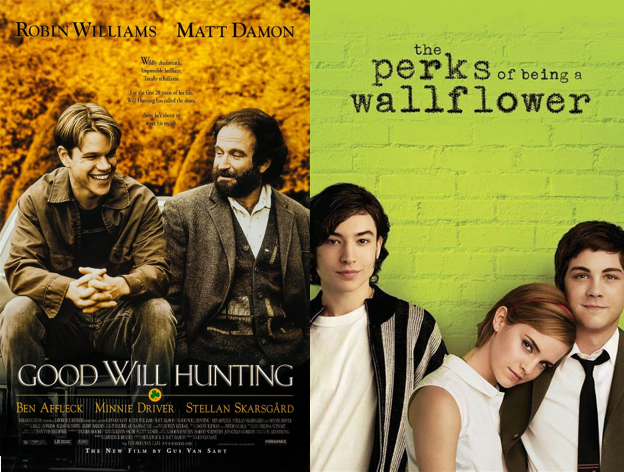Good Will Hunting (1998)
I have chosen the movie Good Will Hunting (1998) for my essay. It follows a kid who is a genius. The catch is that he has grown up in an environment that should have never created someone so bright. He went through the foster system many times, has been beaten by his foster parents, and now refuses to get too close and trust anyone he has met. He also gets himself into a lot of trouble. When Will, the protagonist, solves a complex problem on an MIT chalkboard, he starts a journey where he is discovered by a professor. The professor helps Will get out of prison, with the exception that he must go to therapy.
The way this film tackles therapy is one of my main points. As stated by Arenas-Rojas, films usually show psychology and therapy in a very stereotypical way. It is usually shown as overly negative or overly positive. There are not many examples of films showing a more realistic side of therapy and psychology. Good Will Hunting shows how it is not all positive or all negative. Throughout the movie, many scenes of therapy show how there can be days where progress is made, and there can be days that it feels like you are regressing. There are many more things that I plan to bring up via the mental health and psychology of the film.
Another topic I want to discuss is the classist ideas throughout the film. Will is depicted as someone in the working class or even working poor. He and his friends are shown to be in and out of jobs and live in a very poor neighbourhood. But Will himself, is the exact opposite of the stereotype for a poor kid. Many of the stereotypes depict them as rather dull and below average in IQ or as less deserving of wealth. This is even shown by some of Will’s friends in the movie. One thing that stands out is many characters in these conditions want to leave them as soon as possible, but Will is the exact opposite. He is scared to move on and get away even though he could have a long time ago.
The education system is shown to be flawed in Good Will Hunting. Will is able to learn and become a genius without having a degree and going through education, at almost any level. He is also stereotyped by the professor who helps him initially because Will was working as the janitor. This causes the professor to assume he is graffitiing the math problem instead of solving it.
I also plan to describe the mise en scene of the movie and the camera movement, or lack there of, to show how they develop the scenes. The film allows for a lot of the emotional moments through dialogue with a still camera. I am also still working on my sources that I want to use for my second and third main points. Another point I am considering adding in is trauma and how it is depicted with Will. He puts up defense mechanisms due to his past experiences that prevents him from opening up to Sean and getting close to Skylar.
I am struggling a bit with my comparison as well but am leaning towards The Perks of Being a Wallflower (2012) as it also deals with mental health issues and trauma. I can compare how Will and Charlie go through their discovery of their problems and how it differs.

Ryan
Adriana Marcela Arenas-Rojas. (2021). Cinema and Psychiatry’s relationship through time and its role in current medical education. Revista de Medicina y Cine / Journal of Medicine and Movies, 17(1), 41–47. https://doi-org.ezproxy.tru.ca/10.14201/rmc20211714147
because I forgot to add it
tatkins
So far so good. I have not seen the comparison movie so can’t comment on its value, but your comparison plans sound plausible. Class definitely features here as well… Good source. Maybe there’s something that talks about class in relation to stereotypes of mental illness. I imagine there are sources since so many of the values of therapy are solidly middle class (big problem). Good luck! Not much time left so don’t fret over it.